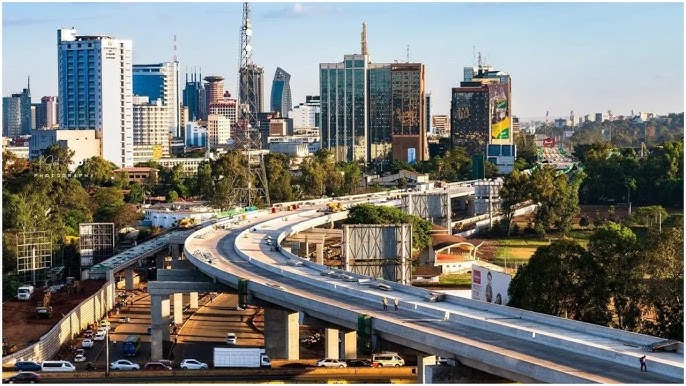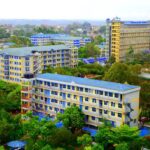The Nairobi Expressway remains a vital route for motorists looking to bypass heavy traffic along Mombasa Road and Uhuru Highway. Since its launch, it has significantly reduced travel time between Mlolongo and Westlands. However, its toll charges have been a subject of discussion, with periodic adjustments based on inflation and exchange rates.
This article provides a comprehensive guide to the latest Nairobi Expressway toll charges for 2025, helping you plan your travel costs effectively.
New Nairobi Expressway Toll Charges for 2025
The base toll rates for saloon cars (Class 3 vehicles) have been adjusted. The charges exclude VAT and may change based on factors such as the Consumer Price Index (CPI) and exchange rate fluctuations.
Updated Toll Charges for Saloon Cars (Class 3)
The table below outlines the toll rates based on entry and exit points:
| Entrance/Exit | Mlolongo | Syokimau | SGR | JKIA | Eastern Bypass | Southern Bypass | Capital Centre | Haile Selassie | Museum Hill | The Mall | Nairobi Westlands |
|---|---|---|---|---|---|---|---|---|---|---|---|
| Mlolongo | – | – | 250 | – | 250 | 330 | 410 | 410 | 500 | 500 | 500 |
| Syokimau | – | – | 170 | – | 250 | 330 | 330 | 410 | 410 | 500 | 500 |
| SGR | – | – | – | – | 170 | 250 | 330 | 330 | 410 | 500 | 410 |
| JKIA | – | – | – | – | 170 | 250 | 250 | 330 | 330 | 500 | 410 |
| Eastern Bypass | 250 | 250 | 170 | 170 | – | 170 | 250 | 250 | 330 | – | 410 |
| Southern Bypass | 330 | 330 | 250 | 250 | 170 | – | 170 | 170 | 250 | – | 250 |
| Capital Centre | 410 | 330 | 330 | 250 | 250 | 170 | – | 170 | 170 | – | 250 |
| Haile Selassie | 410 | 410 | 330 | 330 | 250 | 170 | 170 | – | 170 | – | 250 |
| Museum Hill | 500 | 410 | 410 | 330 | 330 | 250 | 170 | 170 | – | – | 250 |
| The Mall | 500 | 500 | 500 | 500 | – | – | – | – | – | – | – |
| Nairobi Westlands | 500 | 500 | 410 | 410 | 410 | 250 | 250 | 250 | 250 | – | – |
Vehicle Classifications and Charges
The toll charges vary depending on the class of vehicle:
| Vehicle Class | Description | Base Toll Rate Multiplier |
|---|---|---|
| Class 1 | Two-wheeled motor vehicles (motorbikes) | Prohibited |
| Class 2 | Three-wheeled motor vehicles (tuk-tuks) | Prohibited |
| Class 3 | Light vehicles with two axles (saloon cars) | x1 |
| Class 4 | Light vehicles with two axles and a high bonnet (SUVs, pick-ups) | x1.5 |
| Class 5 | Heavy vehicles with fewer than four axles (buses, small trucks) | x4 |
| Class 6 | Heavy vehicles with four or more axles (trailers, large trucks) | x5 |
Key Insights on the New Toll Charges
- Minimum Toll Charge (KSh. 170) – The cheapest routes include:
- SGR to Eastern Bypass
- JKIA to Eastern Bypass
- Southern Bypass to Capital Centre or Haile Selassie
- Highest Toll Charge (KSh. 500) – The most expensive journeys include:
- Mlolongo to Museum Hill, The Mall, or Nairobi Westlands
- Syokimau to The Mall or Nairobi Westlands
- Routes Not Available – The expressway does not have direct exits to some locations, as indicated by the “-” symbol in the table.
How Toll Charges are Adjusted
The expressway toll rates are subject to adjustments based on:
- Exchange Rate Fluctuations – Since the expressway is a Public-Private Partnership (PPP) operated by Moja Expressway, tolls are adjusted according to the KSh/USD exchange rate.
- Inflation (Consumer Price Index – CPI) – The government adjusts tolls periodically to reflect economic changes.
- Vehicle Type – Heavy vehicles pay higher rates, with multipliers ranging from 1.5x to 5x the base rate.
How to Pay for Nairobi Expressway Toll Fees
Motorists can pay toll charges using multiple payment methods, including:
- Electronic Toll Collection (ETC) – Offers a seamless, cashless experience with discounts for frequent users.
- Manual Toll Collection (MTC) – Cash or card payments at the toll booths.
Benefits of Using the ETC Payment Option
- Faster Processing: No need to stop for cash transactions.
- Discounted Rates: Frequent users enjoy lower toll charges.
- Convenience: Reduces congestion at toll booths.
Is the Nairobi Expressway Worth It?
For many commuters and business travelers, the expressway provides: ✔ Faster travel times – Cutting a journey that takes 1-2 hours on Mombasa Road to 15-20 minutes.
✔ Reduced fuel costs – Less time in traffic means lower fuel consumption.
✔ Better security – Surveillance cameras and reduced roadside interactions enhance safety.
However, frequent users face high toll costs, making it essential to plan trips efficiently.
The Nairobi Expressway toll charges for 2025 have increased slightly due to economic adjustments. While it remains a costly route, the time savings and convenience often outweigh the costs for many users.





